© 2026 ALLCITY Network Inc.
All rights reserved.

General manager James Jones deserves a ton of credit for molding the Phoenix Suns’ roster into a contender in just a few short years, but also for meticulously crafting it with flexibility in mind. The Suns were built to win now, but with armed with young players on the rise, salaries capable of meeting all trade requirements and all of their first-round draft picks, this team was prepared for the moment a superstar like Kevin Durant might become available.
Thursday dropped a bombshell on the 2022 NBA free agency period with the news that not only was Durant requesting a trade, but listing Phoenix as his preferred destination.
KD still has four years and $194.2 million left on his contract, but given his superstar pull and the Brooklyn Nets’ unwillingness to commit long-term to Kyrie Irving, the writing has been on the wall for weeks now.
Durant listing the Suns as his preferred landing spot was still surprising, especially after Irving opted in for another year in Brooklyn, but now the question shifts to how Jones can pull off his greatest move yet with so many moving parts. The math is complicated and the free agency landscape is constantly shifting.
Fortunately, that’s what yours truly is here for. Below are 10 potential trades that would bring the Slim Reaper to the Valley of the Sun. Consider this a thought exercise on what might happen, with trades that are actually legal, rather than an opinion on what should happen.
Editor’s note: None of these deals include Devin Booker. There was a report circulating on Thursday that the Nets’ asking price in a Suns deal would start with Book, but that’s impossible for several reasons. First, a team cannot trade for two players on a designated rookie max extension, and with Booker being one, the Nets already have Ben Simmons. Second, a player who signs a super-max — as Booker just did — cannot be traded for a year. Finally, Durant wants to come to Phoenix to play with Booker, so trading him would be a nonstarter. This was Posturing 101 on the Nets’ part to start the bartering high.
Now that we’ve got that out of the way, let’s dive in.
3 basic Deandre Ayton sign-and-trades to Nets
As we’ve covered multiple times before, most Kevin Durant trades will have to revolve around a Deandre Ayton sign-and-trade. There have been numerous reports of friction between DA and the Suns, and at the very least, we know the two parties don’t see eye-to-eye on his value since he never got the five-year max extension he wanted.
That worked out well for Phoenix, since nobody else is chomping at the bit to hand him even a four-year max. Also, a team can only have one player on the designated rookie max extension that they traded for on their roster at a given time. The Nets already have one on their roster in Ben Simmons, so the Suns dodged a restrictive bullet with Ayton there.
The problem is, sign-and-trades are tricky to work out financially, due to two major factors:
- Any team landing a player through sign-and-trade is immediately hard-capped at the luxury tax apron (just shy of $157 million this year).
- A rule called “base-year compensation” reduces a player’s outgoing salary to only being worth half of their new starting salary.
Point No. 1 means that any team acquiring Ayton in a sign-and-trade cannot exceed $157 million in salary immediately after the trade or at any point thereafter. Point No. 2 means that if Ayton signs a three- or four-year max with his new team, from the Suns’ side of the equation, his outgoing salary value will only count for approximately $15.5 million — half of the $30.9 million he’ll earn in the first season of his new contract.
That makes it tricky to both satisfy the CBA requirements for incoming and outgoing salary for each involved team, on top of making sure Ayton’s new team is well below the tax apron.
The Nets’ early activity on Thursday didn’t help matters. Trading a 2023 first-round pick for Royce O’Neale added $9.2 million in salary. Kyrie Irving opting in accounted for $36.5 million, and then Brooklyn re-signed Patty Mills and Nic Claxton, who will count for another estimated $17.3 million combined.
Add it all up and in most of these deals below, the Nets will have to shed significant salary first, taking very little money back in return. Bearing all that pesky math in mind, our first three deals paint a daunting picture of how much the Suns will have to give up, because most likely, not one of these would be enough.
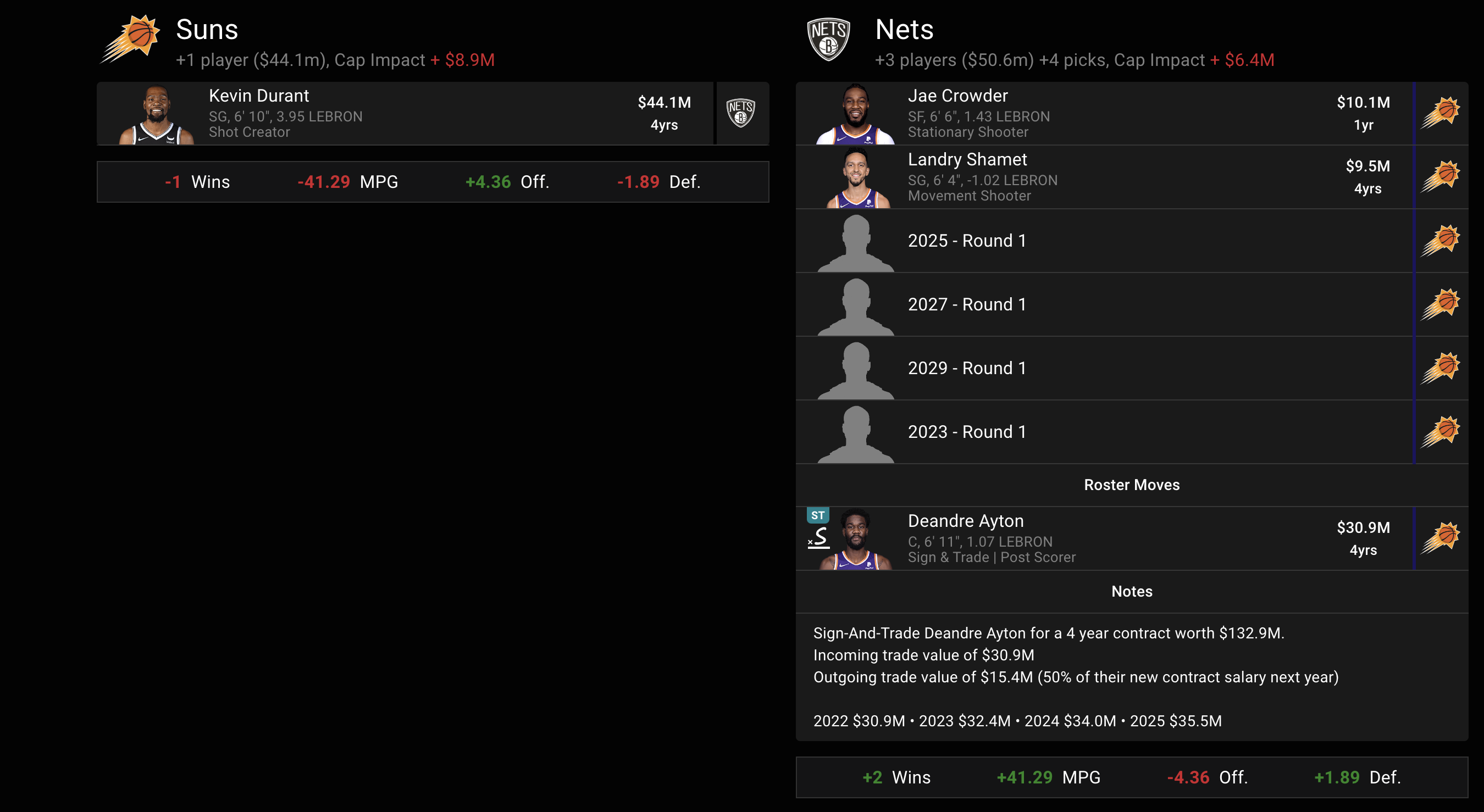
Mathematically, it checks out. The Suns take on Durant’s base salary (which is actually just shy of $43 million, not $44.1 million) and ship out $35.1 million themselves. The Nets are taking on $51.4 million, since Ayton’s incoming salary still counts for the full $30.9 million on their end, but for the trade itself, that’s okay given the amount they’re sending out.
However, even with four unprotected first-rounders and two additional pick swaps thrown in, it’s hard to see the Nets accepting a package that doesn’t include at least two of the Ayton-Mikal Bridges-Cam Johnson trio. Jae Crowder is an expiring contract, and Landry Shamet is useful shooter on a movable deal, since the third year is non-guaranteed and the fourth year is a team option. But this screams, “Please don’t notice we’re keeping the Twins.”
The Nets would also have to free up about $23.4 million to get under the tax apron. They could get there by dumping Royce O’Neale and Joe Harris for practically nothing, but that’s easier said than done. A Kyrie Irving trade that takes back less than $13.1 million also works, but again, good luck shedding that kind of max salary without getting much in return.
This next option is a little better, but keep in mind, there will be a bidding war for Durant’s services. Even approaching his 34th birthday, top-20 players of all-time don’t usually hit the market while they’re still in their prime, with four years left in their contract.
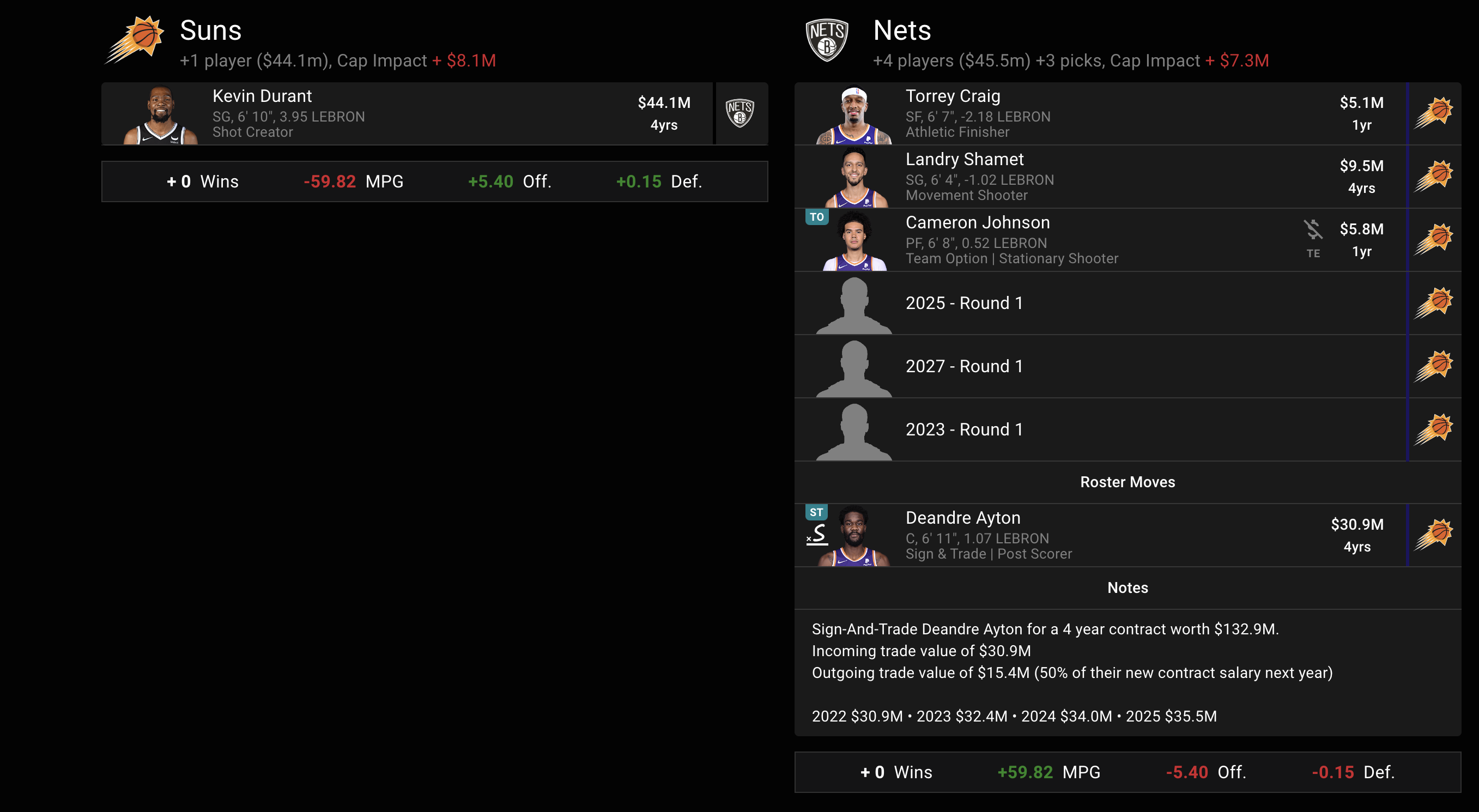
Getting warmer. DA is still the centerpiece, only this time, Cam Johnson is thrown in. He’s not an All-Star, but he’s a 26-year-old wing who can defend multiple positions and is one of the NBA’s elite shooters. Torrey Craig gets tossed in to help account for the difference in salary between Crowder and Johnson, and three unprotected firsts are still included.
Unfortunately, Brooklyn runs into the same hard-cap problem of needing to shed about $24.2 million in salary before the deal can go through. They could also probably beat this offer elsewhere.
So if that’s still not enough, Ayton and Mikal Bridges for Kevin Durant works straight up, perhaps with a few first-rounders thrown in:
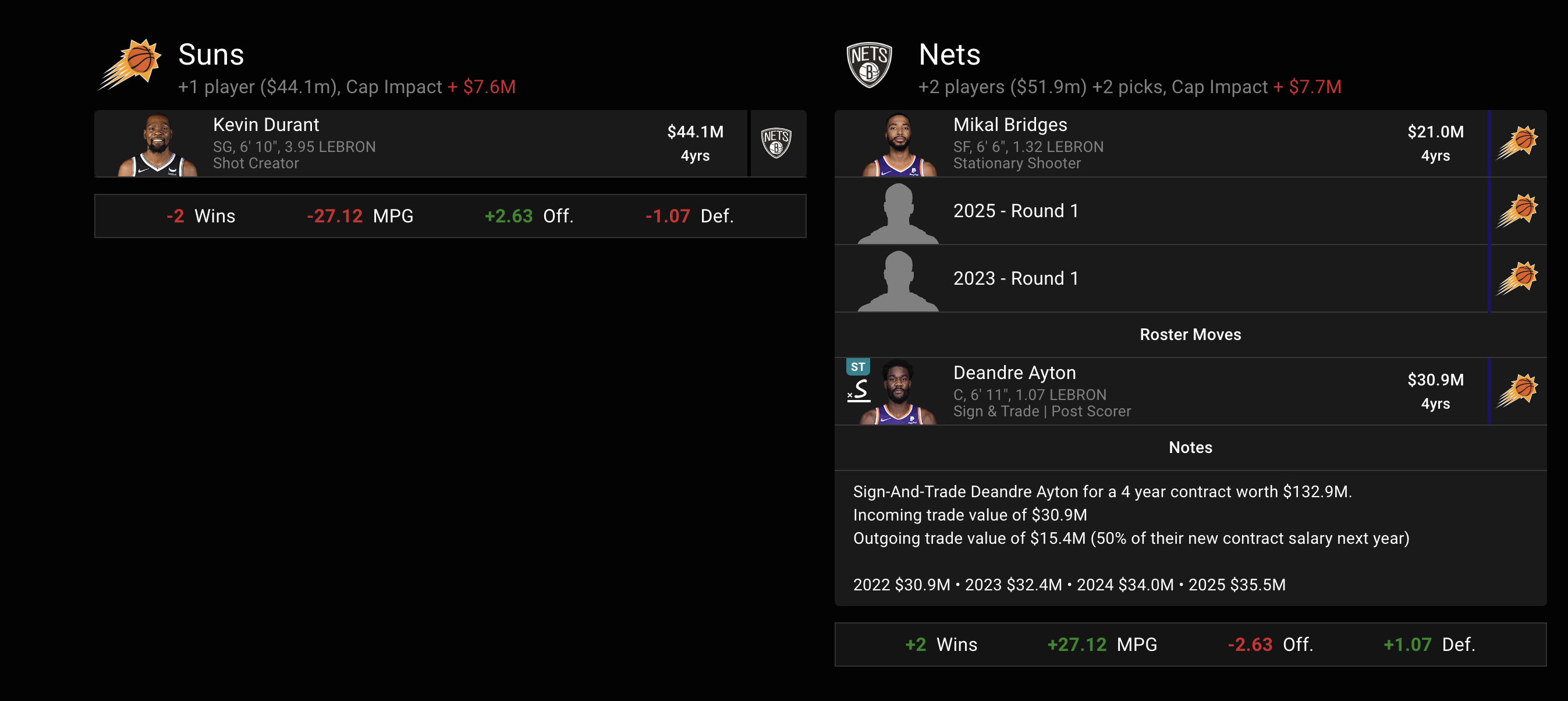
Losing Bridges would undeniably sting. He was the runner-up for Defensive Player of the Year, can shoot the 3-ball and is improving as an attacker off the dribble. He could be a two-way star soon and is one of the biggest fan favorites in franchise history.
With that being said, this is Kevin Durant we’re talking about here. You make that trade 10 times out of 10 in pursuit of a title, and with only DA and Bridges involved, Phoenix preserves a lot of its depth.
Again, the Nets will need to shed about $24.7 million in salary to make something like this happen and duck that $157 million tax apron. For one of these two-team DA sign-and-trades to go through, it’ll take extra moves on Brooklyn’s part to pave the way.
A superstar blockbuster
For the record, this one’s a bad idea. But since people keep asking about Kyrie Irving and his trade value, we cooked this one up to be thorough:
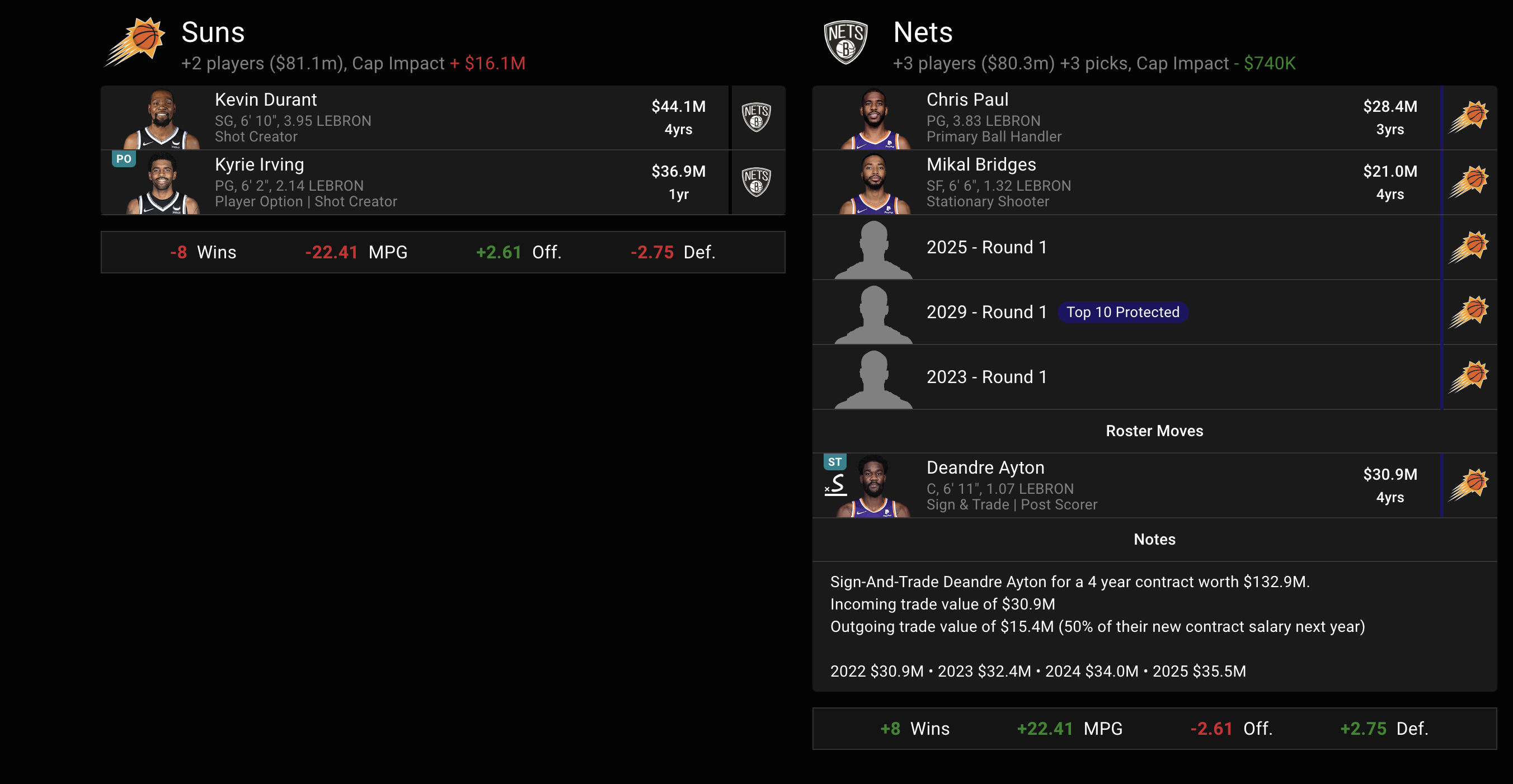
Mathematically, it checks out. The Nets take on $80.3 million in salary between DA, Bridges and Chris Paul, while sending out $79.5 million. That amount squeezes right under the $81.1 million the Suns are allowed to take back, given that they’re sending out $64.9 million and can only take back 125 percent of that amount.
Unfortunately for those who relish drama, this will never happen. According to a source, Durant and Irving are not opposed to the idea of playing together next year, but it’s not a sticking point for KD either. Irving is a phenomenal player, but it’s been repeatedly proven he’s not worth the headache, nor has he been a winning basketball player outside of his partnership with LeBron James.
Paul is one of Booker’s favorite teammates as well as one of Monty Williams’ favorite players. He helped turn the culture around, has proven he can impact winning at every stage of his career and made an All-NBA team and won a playoff series more recently than Irving.
Yes, CP3’s body has broken down on him in the last two postseasons, but Irving hasn’t been the pinnacle of health either, especially when one remembers his stubborn refusal to get vaccinated forced him to miss half his team’s games.
Comparing the two’s impact on winning, even at this stage of their careers, would be akin to “doing your own research”: You’re not going to find much to prove your point that has merit in the real world.
We could go into detail about why it’d make no sense for Brooklyn to trade for the Point God at age 37, or how toxic Phoenix’s immaculate vibes could become, or how the Nets would still need to shed about $16.6 million just to make this deal happen. But since these Kevin Durant trades are supposed to inspire positive thoughts, let’s just move on.
A super-duper (x4) blockbuster
Let’s get crazy for a sec before coming back down to earth. While the Suns should want nothing to do with Irving, everyone already knows the Los Angeles Lakers would be all over LeBron’s former running mate…if they had literally any assets that were of interest to Brooklyn.
To that end, how about pouring some gasoline on the whole situation?
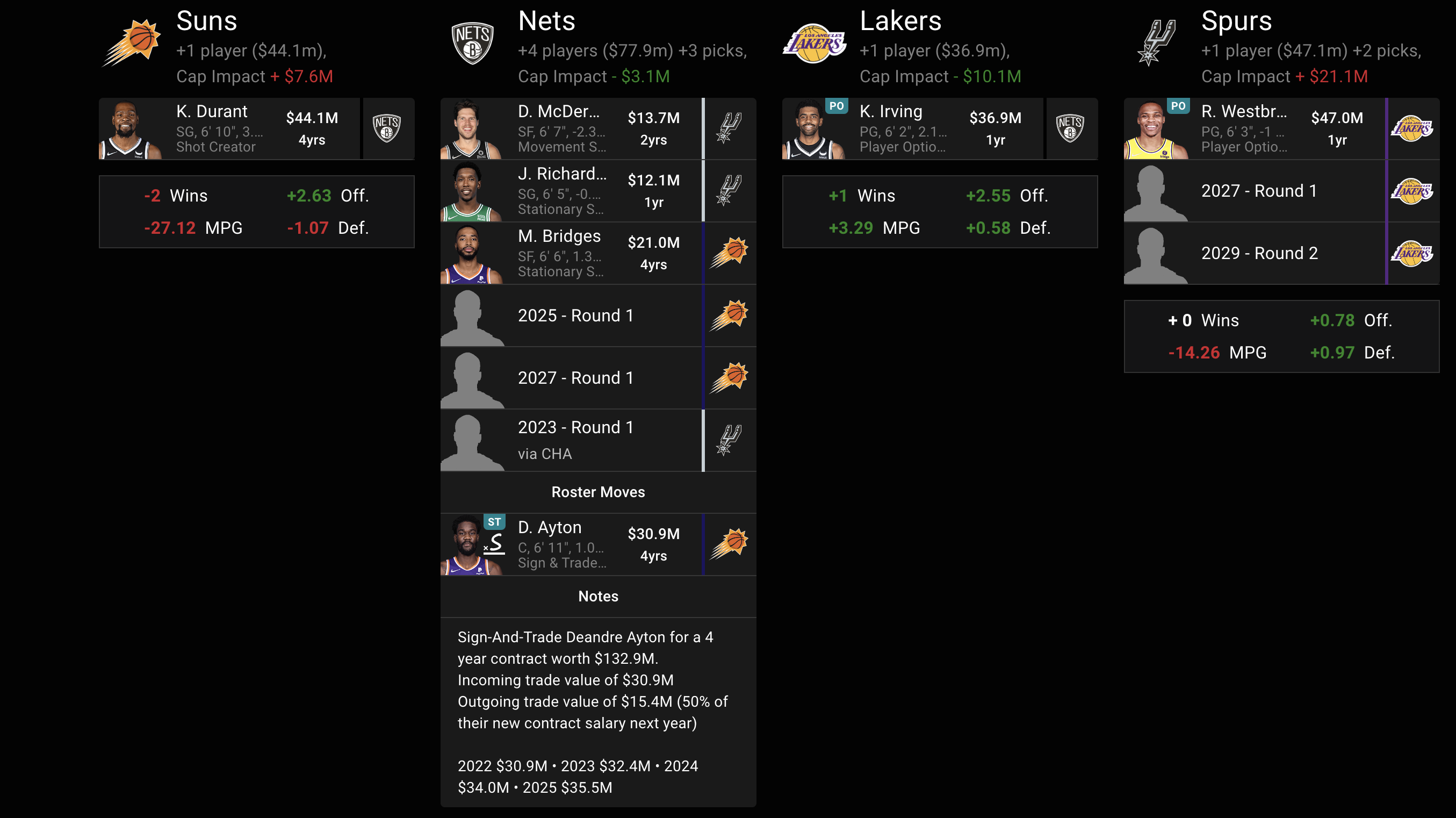
To recap: The Suns get Kevin Durant and only have to give up Ayton, Bridges and two first-rounders. The Nets would need to shave off about $500,000 first to get it done, but they’d add two young cornerstones with DA and Bridges, a decent swingman on an expiring contract they could flip in Josh Richardson, and a useful shooter on a team-friendly deal in Doug McDermott. Oh, and two unprotected firsts from Phoenix, plus a 2023 first-rounder from the Charlotte Hornets (via San Antonio) that could easily wind up in the lottery of a stacked draft class.
The Lakers get their guy in Irving, and all the Lakers haters get to relish watching that injury-prone Big 3 implode. As for the Spurs, they have to take on the final year of Russell Westbrook’s mega-salary, but they’re tanking anyway, and they snag two distant first-rounders in the process. It’s funny picturing Gregg Popovich having to deal with a past-his-prime Westbrook during his final year on the job, but the two have a strong mutual respect and have always praised each other.
Working out four-team trades — let alone with a sign-and-trade involved — is nearly impossible. But maybe it makes more sense than it should for everyone involved?
Taking a break from DA sign-and-trades
Let’s give those DA sign-and-trades a temporary breather. No hard caps, no base-year compensation…just trying to match basic salaries!
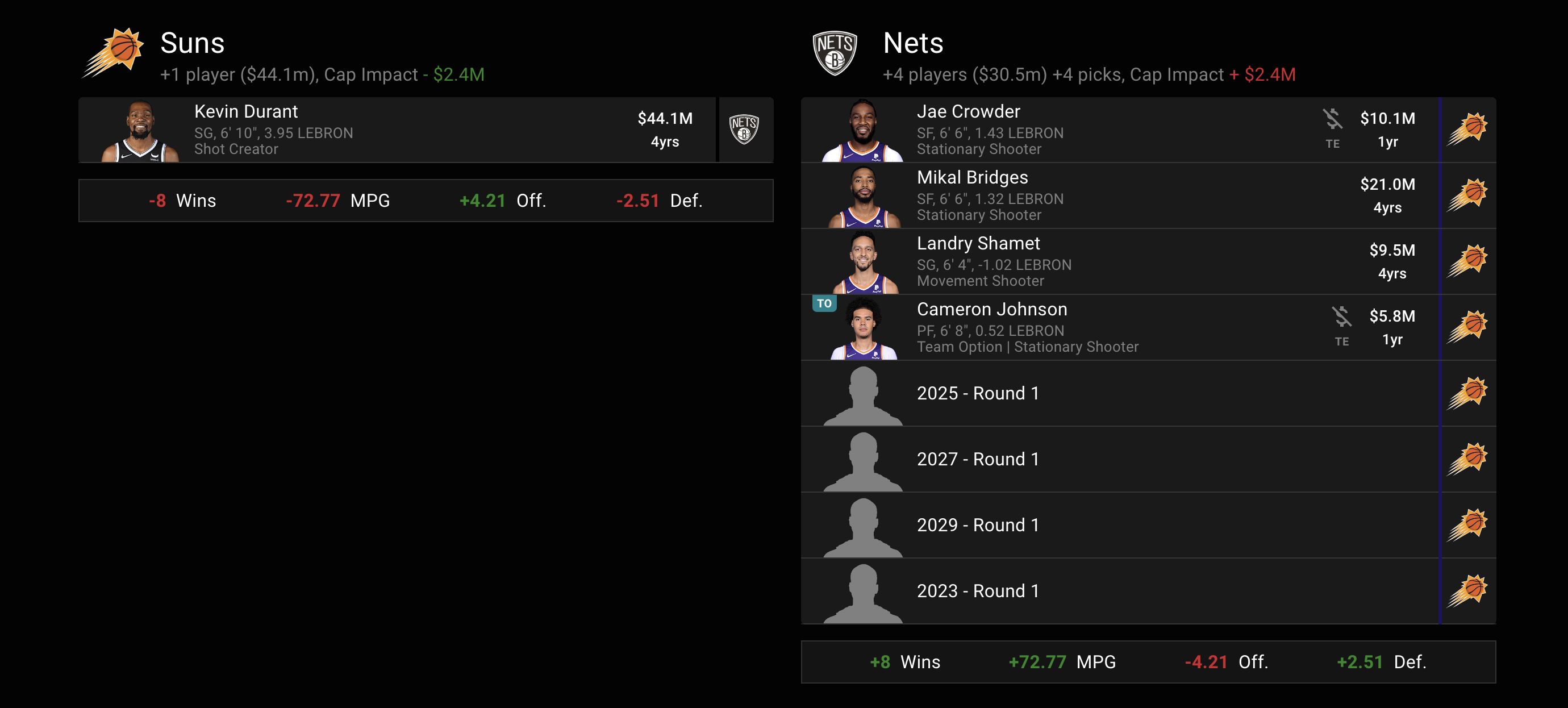
Admittedly, giving up Bridges, Johnson, Crowder and Shamet completely drains the Suns of their wing depth. Because there’s no DA involved, it’d probably take something like four first-round picks and 1-2 additional pick swaps to really move the needle too (thanks a lot, Dejounte Murray).
However, the Nets are reportedly not interested in acquiring Ayton — max or no max. That’s a potential fly in the ointment, since DA’s inclusion makes sense from multiple perspectives: the fact that he’s a young, potential All-Star in the making, the fact that he and the Suns are currently in rocky territory, and even from a simple salary-building perspective.
But if they’re truly not interested in a 24-year-old who’s already one of the best 5-7 centers in the NBA, this deal at least avoids that issue, giving Brooklyn two incredible two-way wings to build around, Crowder’s expiring deal, Shamet’s movable contract and a heap of draft picks.
A 3-team Kevin Durant banger
Of all the trades on this page, this one makes the most sense.
If the Nets don’t want Ayton but covet young players and draft picks, if the Suns want Kevin Durant, and if the Atlanta Hawks want to build around Trae Young, Dejounte Murray and their young core…why not give everybody what they want?
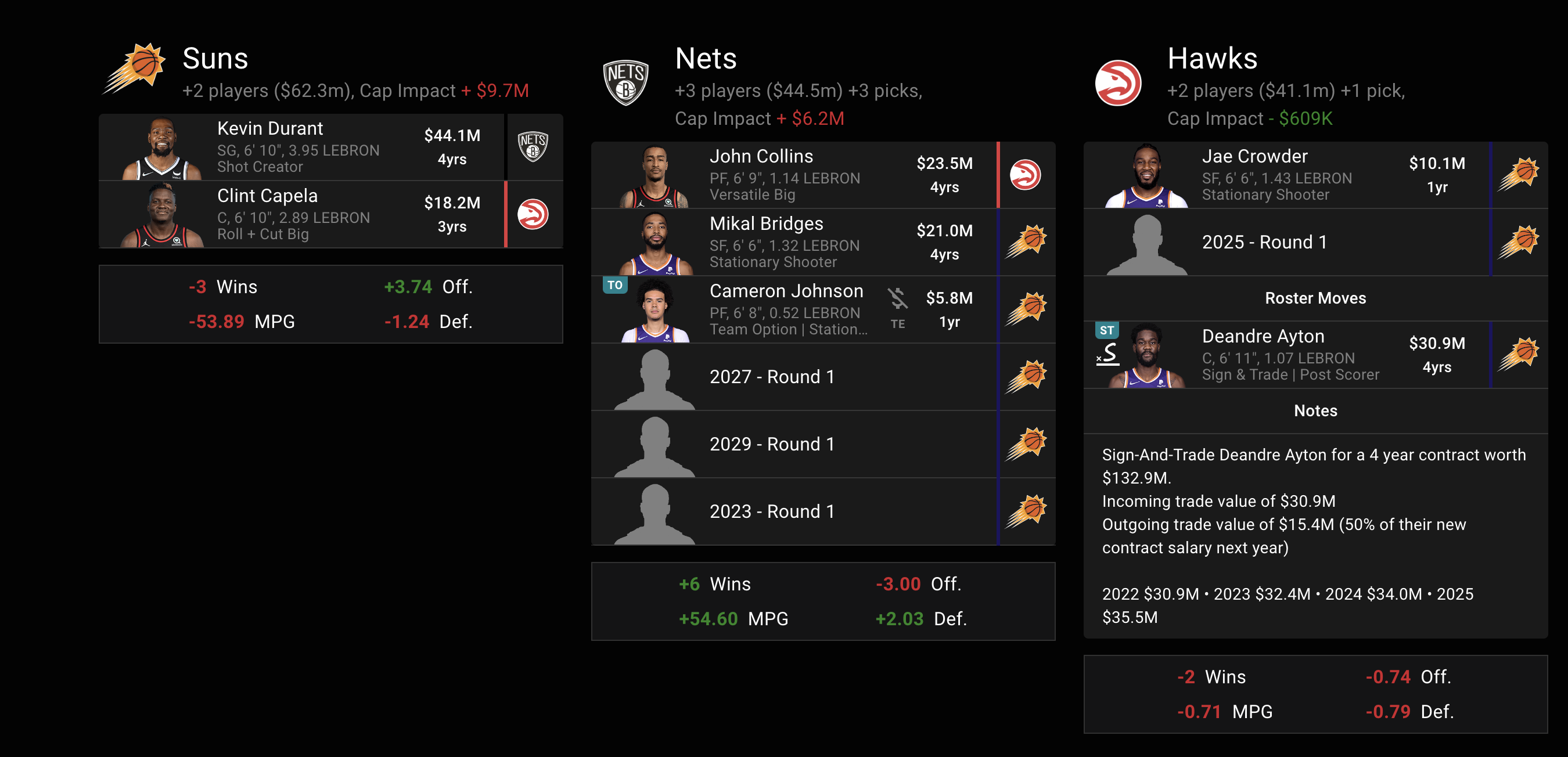
Not only do the Suns land their guy in KD, but they also snag Clint Capela, who’s the best pseudo-replacement for Ayton that they could possibly hope for in a sign-and-trade. He’s more limited offensively, but he’s an effective rim-roller, which is where centers shine playing alongside Chris Paul. Capela’s also a superior rebounder and shot-blocker, which might help compensate for the downgrade in perimeter defense compared to DA.
As for the Nets, not only are they getting two stellar, young wings under team control for the next half-decade in Bridges and Johnson, but they’re also getting John Collins from Atlanta. On top of three first-round picks from Phoenix, that’s the kind of haul Brooklyn would like to see.
From Atlanta’s perspective, their Aaron Holiday signing and Kevin Huerter trade Friday morning doesn’t necessarily shift the logic here. They actually shed about $3.7 million in salary going from Huerter to Justin Holiday and Maurice Harkless, with Aaron Holiday’s new salary still to be factored in.
Between Young, Murray, Ayton, Crowder, Harkless, Justin Holiday, Bogdan Bogdanovic, De’Andre Hunter, Onyeka Okongwu, Jalen Johnson and rookie AJ Griffin, they would be at $142.6 in salary for 11 players — below the luxury tax apron, with Aaron Holiday, Jock Landale’s non-guaranteed deal and second-round pick Tyrese Martin still to consider. It could be challenging to fill out the rest of the roster below that tax apron, but certainly not impossible.
Giving up both Capela and Collins feels like a lot too, but the Hawks are still getting fairly compensated for their time, landing Ayton to bolster a young core that’s ready to win now. They also get Crowder, a well-respected veteran and locker room leader, to fill in at the 4-spot with Collins gone, plus a 2025 first-rounder for their trouble.
Maybe that’s not enough for the Hawks’ taste, but it’s pretty darn close, and there’s more than enough to build off of here, since they’re getting a Capela upgrade who fits with their timeline better. This trade almost makes too much sense to not happen.
Pacing ourselves for more excitement
If the Nets don’t want DA, and it makes the most sense for Phoenix to move him while trying to keep at least one of the Twins, finding a third team to facilitate will be key. We’ll start with the Indiana Pacers, who have long been one of the most sensible (and underwhelming) sign-and-trade partners for Ayton.
Our original deal included Malcolm Brogdon going to Brooklyn:
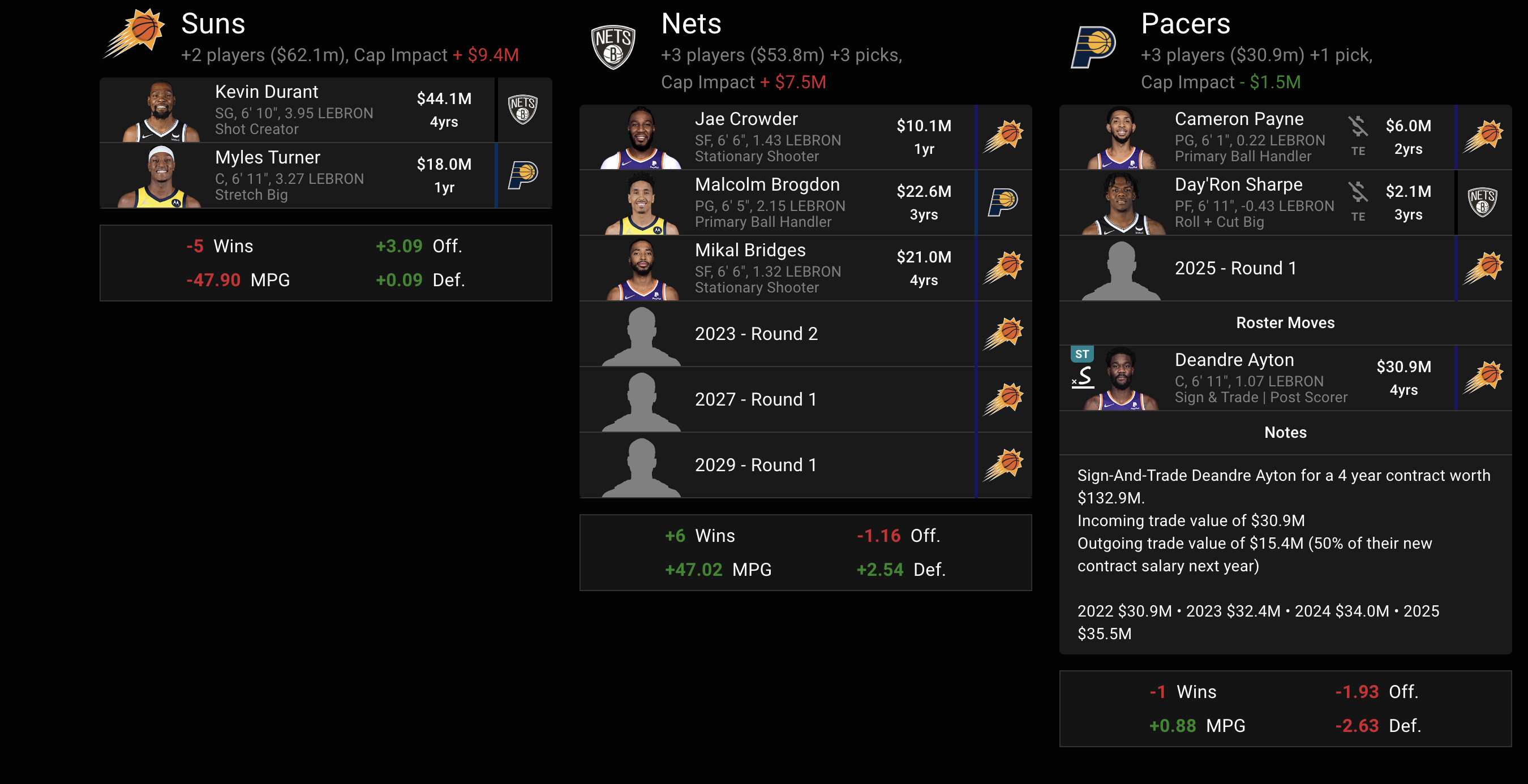
But since he’s already been dealt to the Boston Celtics for a bag of peanuts, how about throwing Buddy Hield in his place?
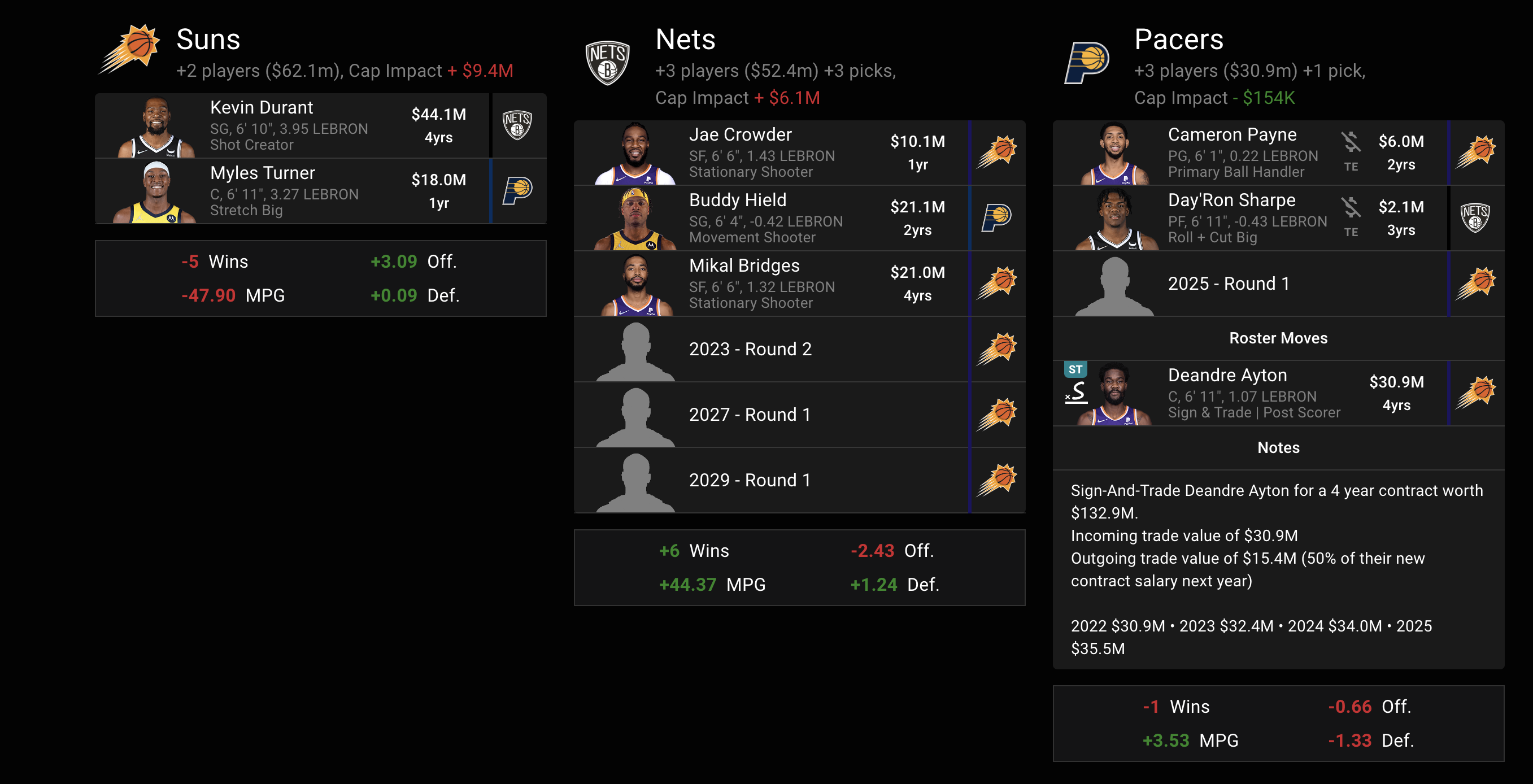
Consider this a much less sexy version of the Hawks trade, with Myles Turner taking Clint Capela’s place. Turner is a league-leading shot-blocker and more competent floor-spacer than either Ayton or Capela, but his rebounding is poor for a 7-footer and he’s not the most mobile defender when switched out onto the perimeter.
The Suns are keeping Cam Johnson in this deal, but giving up four first-rounders — three to Brooklyn and one to Indiana, who needs a sweetener for shedding both Turner and Hield. Getting Ayton back as a Turner upgrade is the centerpiece of the deal, but Cam Payne and Day’Ron Sharpe get tossed in to help balance salaries and give the Pacers a look at a couple of moldable guys.
The Pacers are well below the tax apron and have max cap space following the Brogdon trade, so being hard-capped won’t really affect them as they turn things over to the youth movement. They clear the backcourt logjam by dealing Brogdon and Hield, turn the page from the Turner era with a superior center, and pocket a future first-rounder for their trouble. The biggest question is whether that return is enticing enough for Brooklyn.
Another 3-teamer with Toronto
The Toronto Raptors could probably put together a decent offer themselves for Kevin Durant, but in this scenario, they bag another guy they’ve had their eye on for weeks now in Deandre Ayton.
The Raptors are in the market for an elite center, and Rudy Gobert’s asking price may be too high. If that’s the case, getting in on the Suns’ bid for KD could open the door for Ayton, even after giving Chris Boucher a three-year, $35.3 million extension.
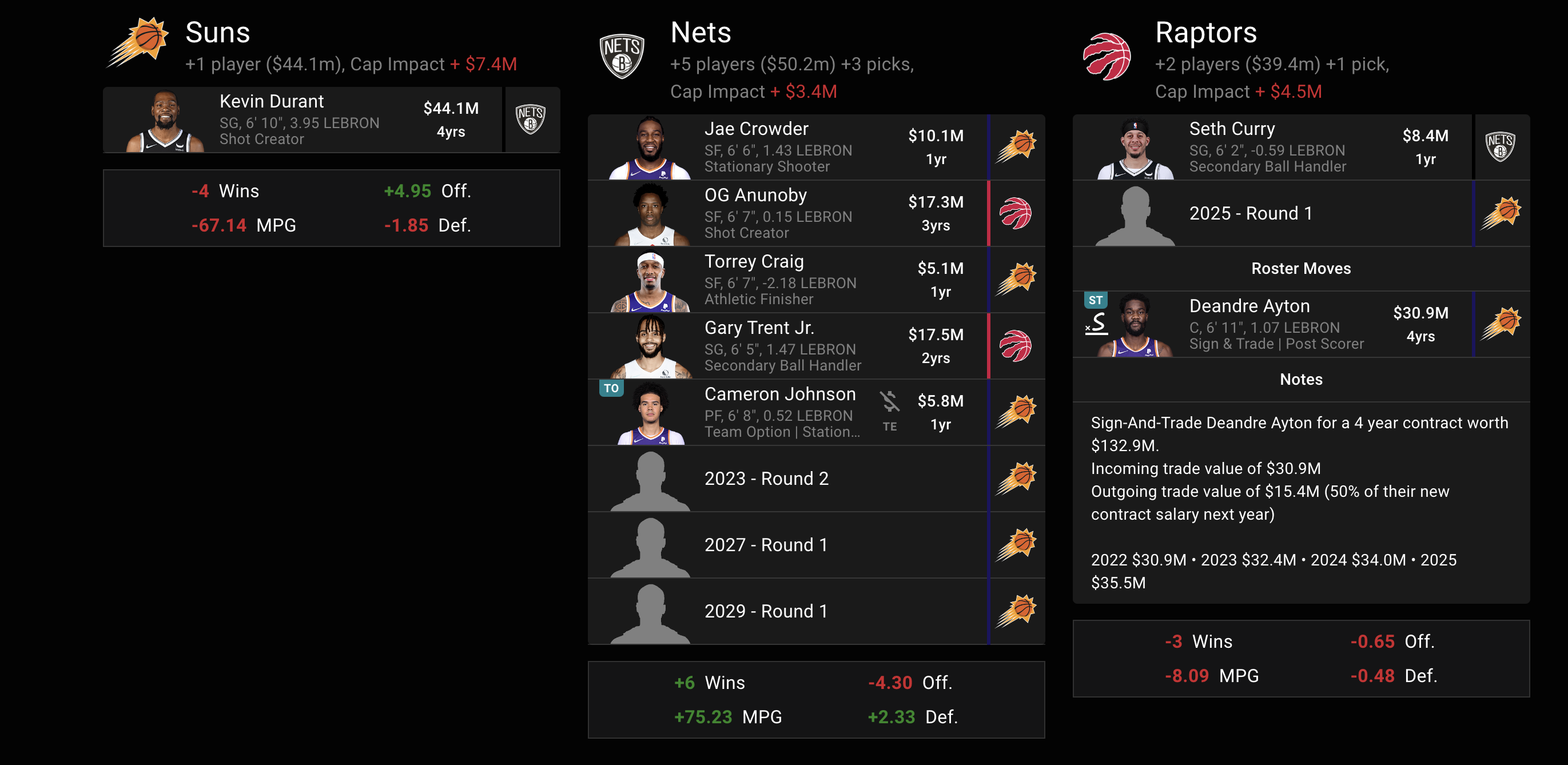
This deal would be incredible for the Suns, who manage to keep Mikal Bridges out of the proceedings. Giving up Ayton, Johnson, Crowder, Craig and four first-rounders deprives them of wing depth and future assets, but having a Big 4 of Chris Paul, Devin Booker, Mikal Bridges and Kevin Durant would be well worth it.
The Nets may not get a blue-chip prospect with this deal, but Anunoby and Johnson are both excellent young wings, and the team could remain competitive between those two, veteran wings like Crowder and Craig, and the underrated Gary Trent Jr., who shoots the lights out and enjoyed a career year in Toronto last season. Plus, more picks!
As for the Raptors, Ayton alone wouldn’t be enough of a return for giving up Anunoby and Trent. So how about Seth Curry, a lethal shooter and floor-spacer in his own right, plus an unprotected 2025 first-rounder from Phoenix?
Suns get their stud…and Kevin Durant too
Come on, you seriously thought I wouldn’t try to sneak one last Jakob Poeltl trade in here? It’s like you don’t read my articles or listen to the PHNX Suns Podcast at all!
In all seriousness, Poeltl is a sorely underrated center who’s a better rim protector and maybe even a better all-around defender than Ayton. He’d obviously be a downgrade overall at the 5-spot compared to DA, but if you’re adding Kevin Durant to your core, you can absolutely contend with Poeltl as your starting big man.
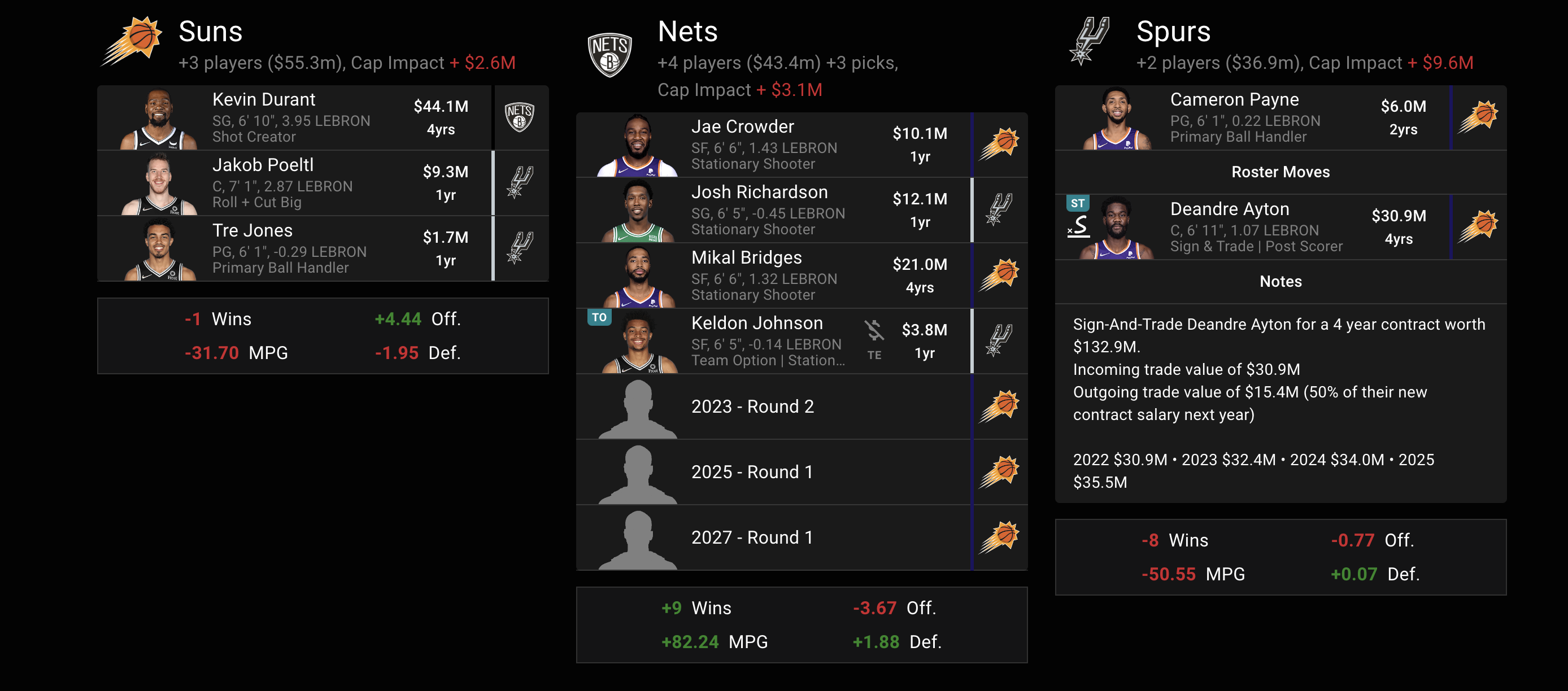
Aside from KD and Poeltl, Tre Jones arrives in Phoenix to help balance salaries and make up for the loss of Cam Payne in the trade. If he doesn’t pan out, Jones’ minimal salary is non-guaranteed. This deal also allows Phoenix to keep Cam Johnson.
The Nets land young, talented wings in Bridges and Keldon Johnson, while Josh Richardson and Jae Crowder keep them competitive on expiring contracts. Toss in 3-4 extra draft picks and maybe Brooklyn bites.
As for the Spurs, they’re getting their hands on Deandre Ayton, and if anyone could unlock his potential to actually create his own offense, it’s probably Gregg Popovich. Then again, Ayton is best optimized as a roll man with an elite point guard (what he has in Phoenix), and he’d have to run a lot of the show on a tanking Spurs team.
After dumping Murry for a whole bag of draft picks, there’s a possibility San Antonio doesn’t even want a player like Ayton, who would help make them a better team. On the other hand, Ayton isn’t carrying that group of G Leaguers out of the tank race, and neither is Payne, who’d be another fun Pop project. The Spurs have more cap space than they know what to do with, and throwing a max at DA in a sign-and-trade would make them stronger for the future without taking them out of the Victor Wembanyama sweepstakes.
Maybe another first-rounder or a pick swap would be required to entice the Spurs, but for Suns fans worried about what kind of monster DA would become on their dreaded rival, relax. You’re getting Kevin-freaking-Durant if any one of these deals falls into place.
Bonus: A snazzy, Jazzy deal
On Friday, in the wake of the Utah Jazz’s mega Rudy Gobert trade, Arizona Sports‘ John Gambadoro reported that the Jazz could have interest in Ayton. That automatically put Utah into the conversation as a third-team facilitator, though it’s worth noting there are conflicting opinions on what the Jazz intend to do with Donovan Mitchell:
In any case, Donovan Mitchell’s inclusion might be a nonstarter unless it expanded to a multi-team blockbuster involving the Miami Heat. The reason? Mitchell is on that same designated rookie max extension, which means he cannot be traded to the Nets unless they first move Ben Simmons elsewhere.
So if we’re just working with DA going to Utah and the Suns getting KD, there are a lot of moving pieces to account for, especially since the Jazz just acquired Malik Beasley, Patrick Beverley, Jarred Vanderbilt, rookie Walker Kessler, and Leandro Bolmaro. However, this deal checks out mathematically:
- Suns receive: Kevin Durant, Jordan Clarkson
- Jazz receive: Deandre Ayton, Cam Payne, Day’Ron Sharpe
- Nets receive: Cam Johnson, Jae Crowder, Landry Shamet, Malik Beasley, Jarred Vanderbilt, one first-round pick from Utah, four first-round picks from Phoenix and two additional pick swaps from Phoenix
Each team takes on additional salary here, but not too much to make the trade illegal. The Suns get KD and bolster some of their lost wing depth with a sixth man with some firepower in Clarkson.
The Jazz add Ayton to pair with Mitchell, and it only costs them Beasley, Vanderbilt and one of the four extra first-rounders they just added in the Gobert trade. The sign-and-trade would trigger the hard cap, but between Mitchell, Ayton, Payne, Sharpe, Beverley, Kessler, Bolmaro, Mike Conley, Bojan Bogdanovic, Jordan Clarkson, Nickeil Alexander-Walker, Udoka Azubuike and Jared Butler, the Jazz would have about $144 tied up in 13 players — leaving them about $13 million under the tax apron with two roster spots to fill.
The Nets score two young wings with potential in Johnson and Beasley, a defensive stalwart in Vanderbilt, movable contracts in Crowder and Shamet, and a whopping five picks and two pick swaps. Maybe the players heading to Brooklyn aren’t good enough to headline a Kevin Durant package, but those five picks and two pick swaps sure don’t hurt.
Comments
Share your thoughts
Join the conversation



